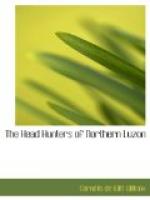“The old men who had performed the feast, after things had quieted down somewhat, began scolding and cursing those who had run away with the meat. Finally they managed to prevail upon the meat-snatchers to bring back three small pieces, about the size of their hands, from which I concluded that Ifugao is a language which is admirably adapted to making people ashamed of themselves. For I knew how hungry for meat these Ifugao become.
“Three old men stuck their spears in a piece of meat and began a long story whose text was the confusion of enemies in some past time. At the conclusion of each story, they said: ’Not there, but here; not then, but now.’ By a sort of simple witchcraft, the mere telling of these stories is believed to secure a like confusion and destruction of the enemies of the present. When this ceremony had been completed, each old man raised his spear quickly and so was enabled to secure for himself the meat impaled. In one case, one of the old men just missed ripping open the abdomen of the man who stood in front.
“The feast being finished, the people made an attempt to assemble by rancherias. Then they filed along the trail to bury Aliguyen. Nagukaran rancheria took the lead. As the procession came near the grave the men took off their head-dresses and strung them on a long pole, which was laid across the trail. A Nagukaran ranchero went to where Aliguyen was sitting and picked him up, carried him to the grave, and placed him in a sitting posture facing Kurug, the rancheria that killed him, Aliguyen was not wrapped in a death-blanket, as corpses usually are. His body was neglected in order to make him angry, so to incite him to vengeance.
“The grave was a kind of sepulchre dug out of a bank. It was walled up with stones after Aliguyen was placed in it, and an egg thrown against the tomb, whereupon the people yelled: ’Batna kana okukulan di bujolmi ud Kurug! (’So may it happen to our enemies at Kurug!’) The poles on which were strung the head-dresses were taken and hung over the door of Aliguyen’s house. After this the people dispersed to their homes. On the way home they stopped at a stream and washed themselves, praying somewhat as follows: ’Wash, Water, but do not wash away our lives, our pigs, our chickens, our rice, our children. Wash away death by violence, death by the spear, death by sickness. Wash away pests, hunger, and crop-failure, and our enemies. Wash away the visits of the Spear-bearing Nightcomer, the Mountain Haunters, the Ghosts, the Westcomers. Wash away our enemies. Wash as vengeance for him who has gone before.’”
CHAPTER XV
Visit to the Silipan Ifugaos
at Andangle.—The Ibilao
River.—Athletic
feat.—Rest-house and stable at Sabig.
We set out the next day, May 3d, at dawn, our destination being Andangle, selected as a rendezvous of the Silipan Ifugaos, another branch of the great tribe under Gallman’s domination. And, to my great regret, we here parted from Connor, who had accompanied us thus far, but now had to return to his post in Nueva Vizcaya. I have the greatest pleasure in acknowledging here his many courtesies, the good humor and patience with which he answered my many questions, and I hated to see him turn back.




